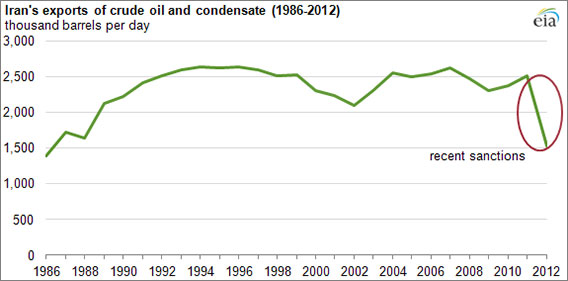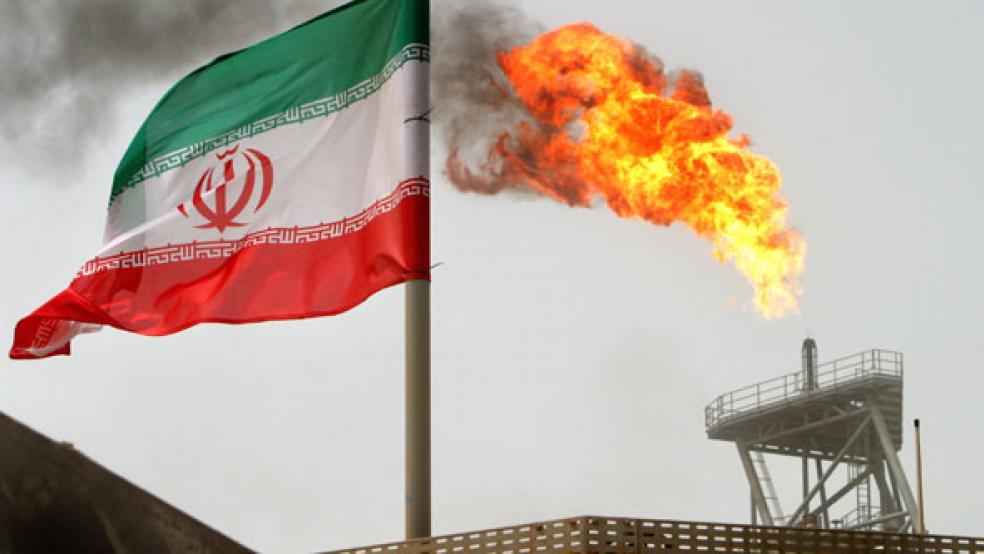Under the terms of the interim nuclear deal struck between the west and Iran last year, Tehran was supposed to reap $7 billion in relief through a combination of factors, including allowing Iran to continue to export one million barrels of oil per month.
Before the deal, Iran’s crude oil exports were down 60 percent from two years ago. The chart below illustrates the dramatic export drop:

According to data from the International Energy Agency (IEA), Iran’s oil exports are making a comeback. Its oil output is up more than 70 percent from October, before the sanctions were eased.
Related: Delay Gives the Iran Nuclear Deal Time to Fall Apart
In January, Iranian crude oil output jumped to 1.32 million barrels from 1.06 million in December. United Against Nuclear Iran (UANI) CEO Mark D. Wallace warned the House Foreign Affairs Committee last month that Iran’s windfall would be much more than what’s allowed in the treaty.
“The White House estimates that Iran stands to receive $6 billion to $7 billion in sanctions relief. The true value of the sanctions relief is well more $20 billion. Just calculate the increase in oil sales lest there be any doubt,” Wallace said. “Now, we believe there will be far less pressure for Iran to actually make material concessions on its nuclear program."
The new IEA numbers confirm Wallace’s concern.
Related: Why the Iran Deal Is America’s Diplomatic Disaster
“These numbers also cast doubt on the accuracy of the administration's estimates for sanctions relief. The $6 or $7 billion estimate does not take into account the tens of billions of dollars Iran will reap from increased oil sales,” Wallace said in a statement. “It is becoming more and more evident that the Geneva deal provided Iran with disproportionate sanctions relief, in exchange for far less significant concessions regarding its nuclear program.”
White House National Security Council spokesman Caitlin Hayden told the Washington Free Beacon that she was not concerned about the spike, and that “Iran’s total exports will average out over the six-month period.” But the White House’s dismissal of the claim does not match growing concerns in the diplomatic community that the deal with Iran would not last and could fall apart. Those involved in negotiations in Geneva yesterday hinted that talks were going south.
“Nobody is expecting a final agreement in this round of talks,” said Michael Mann, the spokesperson for EU High representative Catherine Ashton, who is leading the negotiations on behalf of the P5+1. “[But] we are hoping we can make progress.
Iran’s failure to abide by the terms of the deal is just the latest instance of a negotiating partner getting the better of the United States. If three times makes a trend, then U.S. diplomacy is in deep trouble, because the same thing happened in Syria and Israel.
Related: How Iran and Russia Could Cause an Oil Shock
In exchange for the removal of the threat of military action by the United States, President Bashar al-Assad agreed in September to destroy his chemical weapons. But four and a half months later, it’s now clear that he has not yet abided by the terms of the agreement that kept U.S. military force out of Syria.
Making matters worse, the agreement to keep the United States out of Syria was brokered by Russia, a country that has been on the wrong end of the Edward Snowden affair. U.S. diplomats and law enforcement could not convince Putin to give him up, with Putin giving the NSA leaker asylum while embarrassing the United States.
There are also growing rifts between the United States and Israel over negotiations with the Palestinians. The most high profile of the recent spats is over comments made by Secretary of State John Kerry in Munich earlier this month when he suggested public views of Israel could get worse if negotiations didn’t progress. This promoted rebukes from high-ranking Israelis, including Prime Minister Benjamin Netanyahu.
Now, there are growing concerns that U.S. diplomats could end up on the wrong side of the Iran deal. Tehran dug in its heels Tuesday, vowing that they would not destroy nuclear facilities as part of an agreement.
Former U.N. Ambassador John Bolton, who served under President George W. Bush, warns that these three crises could undermine U.S. standing in the world for decades.
“All three of Obama's diplomatic maneuvers are based on errors and will almost certainly fail. And what will happen then? Failing on one is bad enough, but failing on all three will be devastating,” Bolton wrote in a Los Angeles Times op-ed Tuesday. “There is tragedy ahead for our country if we continue on this course.”
Top Reads from the Fiscal Times:





